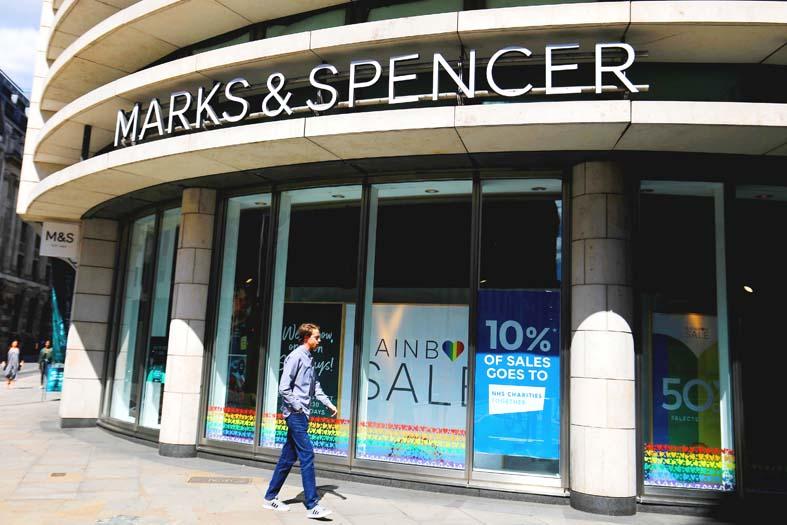Marks & Spencer Group PLC (M&S) is to launch Web sites in 46 new overseas markets to try to revive an international business that has languished for years in spite of multiple turnaround efforts.
The British seller of food, clothing and housewares said the expansion into nations from Nepal to Bolivia and Uzbekistan would extend its online reach to more than 100 countries in a cost-effective way.
Paul Friston, the international director at M&S, said online sales to customers abroad are soaring since the start of the COVID-19 pandemic, jumping by 75 percent in the first half alone as more people worldwide favor shopping from home.

Photo: Tolga Akmen, AFP
The new Web sites would offer a range of clothing and home products, with orders fulfilled through the company’s existing distribution network.
The push would allow the retailer to “explore underlying demand in these markets without significant upfront investment,” Friston said in a statement.
A household name in the UK, Marks & Spencer sells both online and through hundreds of stores across the country.
However, profitability has been falling for years, hurt by a long-struggling clothing and home division, and wider structural changes in the highly competitive UK market.
The international business has also had a mixed record over the past decade, with the brand’s franchise arm generally performing better than wholly owned stores.
In 2011, under then-chief executive officer Marc Bolland, Marks & Spencer returned to France with much fanfare after a 10-year absence. It opened a flagship store on the Champs-Elysees in Paris, which Bolland heralded as a symbol of its success abroad.
However, within several years the retailer was in retreat. It shut that store, along with scores more unprofitable outlets across Europe.
In the past decade, operating profit in M&S’ international division has fallen from £147 million (US$203 million) to just more than £110 million on revenue that has largely hovered around £1 billion.
Steve Rowe, the chief executive officer leading the latest turnaround effort, in May last year said the retailer had completed the first phase of transforming the international business by moving away from direct ownership to a franchise and joint-venture model.
Now the focus is on “localizing ranges, reducing prices and developing sales online globally,” he said.

Three experts in the high technology industry have said that US President Donald Trump’s pledge to impose higher tariffs on Taiwanese semiconductors is part of an effort to force Taiwan Semiconductor Manufacturing Co (TSMC, 台積電) to the negotiating table. In a speech to Republicans on Jan. 27, Trump said he intends to impose tariffs on Taiwan to bring chip production to the US. “The incentive is going to be they’re not going to want to pay a 25, 50 or even a 100 percent tax,” he said. Darson Chiu (邱達生), an economics professor at Taichung-based Tunghai University and director-general of

Hon Hai Precision Industry Co (鴻海精密) is reportedly making another pass at Nissan Motor Co, as the Japanese automaker's tie-up with Honda Motor Co falls apart. Nissan shares rose as much as 6 percent after Taiwan’s Central News Agency reported that Hon Hai chairman Young Liu (劉揚偉) instructed former Nissan executive Jun Seki to connect with French carmaker Renault SA, which holds about 36 percent of Nissan’s stock. Hon Hai, the Taiwanese iPhone-maker also known as Foxconn Technology Group (富士康科技集團), was exploring an investment or buyout of Nissan last year, but backed off in December after the Japanese carmaker penned a deal

WASHINGTON POLICY: Tariffs of 10 percent or more and other new costs are tipped to hit shipments of small parcels, cutting export growth by 1.3 percentage points The decision by US President Donald Trump to ban Chinese companies from using a US tariff loophole would hit tens of billions of dollars of trade and reduce China’s economic growth this year, according to new estimates by economists at Nomura Holdings Inc. According to Nomura’s estimates, last year companies such as Shein (希音) and PDD Holdings Inc’s (拼多多控股) Temu shipped US$46 billion of small parcels to the US to take advantage of the rule that allows items with a declared value under US$800 to enter the US tariff-free. Tariffs of 10 percent or more and other new costs would slash such

SENSOR BUSINESS: The Taiwanese company said that a public tender offer would begin on May 7 through its wholly owned subsidiary Yageo Electronics Japan Yageo Corp (國巨), one of the world’s top three suppliers of passive components, yesterday said it is to launch a tender offer to fully acquire Japan’s Shibaura Electronics Co for up to ¥65.57 billion (US$429.37 million), with an aim to expand its sensor business. The tender offer would be a crucial step for the company to expand its sensor business, Yageo said. Shibaura Electronics is the world’s largest supplier of thermistors, with a market share of 13 percent, research conducted in 2022 by the Japanese firm showed. If a deal goes ahead, it would be the second acquisition of a sensor business since